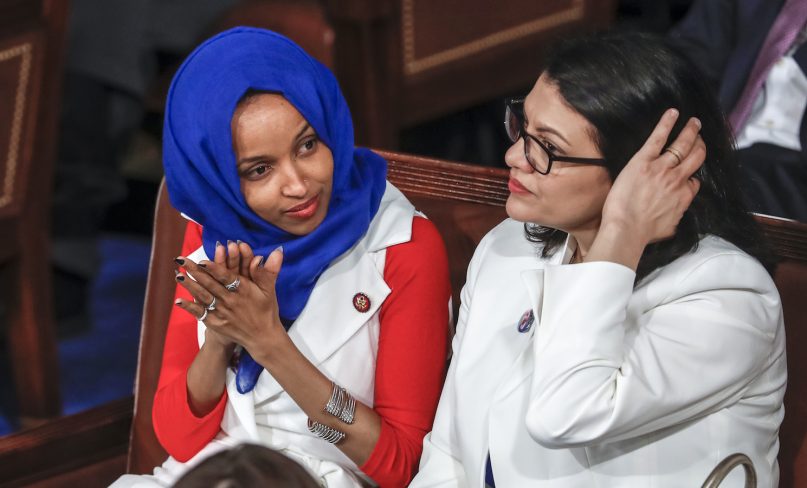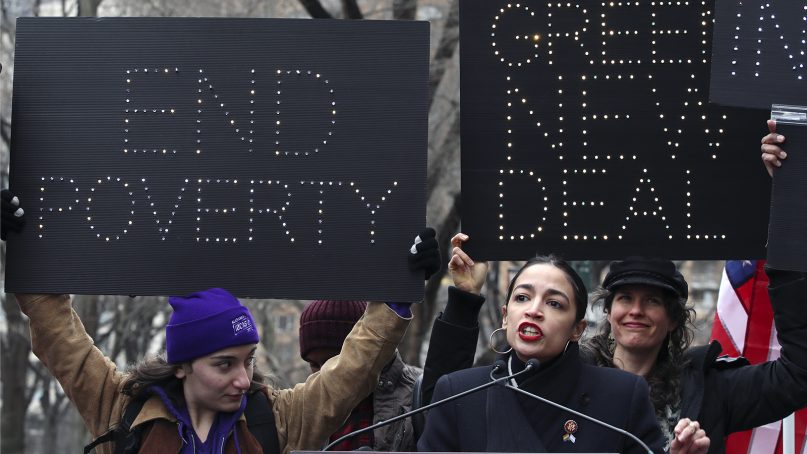
(RNS) — On Tuesday (Nov. 3), the four members of the so-called Squad, an all-female group of Democratic United States representatives first elected in 2018, were re-elected.
They are a religiously and ethnically diverse group, made up of Alexandria Ocasio-Cortez of New York — best known as AOC — who is Catholic; Ayanna Pressley of Massachusetts, who grew up Baptist; and Ilhan Omar of Minnesota and Rashida Tlaib of Michigan, who are both Muslim.
They are often criticized on social media and at rallies by President Donald Trump.
All four say their faith informs their politics and the policies they support.
Here are five quick faith facts about this new version of the God Squad.
1. The Squad reflects bigger religious trends in the U.S.
The two major parties have become increasingly divided when it comes to religion. About two-thirds (63%) of voters who are Republican or lean Republican are white Christians, while 79% of Republicans overall identify as Christian, according to Pew Research. Democrats are more diverse. Only about half (52%) are Christian, including 26% who are Christians of color. Nine percent are from a non-Christian faith, while 38% are unaffiliated. With one Somali-born Muslim, one second-generation Palestinian Muslim, one Black Protestant and one Hispanic Catholic, the Squad fits this larger trend.
2. They are not afraid to talk about religion.
“There’s an Islamic saying: ‘After you take care of your family at home, you take care of your neighborhood,’” Tlaib told The New York Times before her 2018 election. “What brings me close to faith is community organizing.”
“I am a woman of faith and each time we are robbed of a life by a hate-filled act of violence I am reminded that prayer is action,” wrote Pressley in the aftermath of the 2018 Tree of Life shooting in Pittsburgh.
Ocasio-Cortez wrote about her faith for America magazine in 2018, saying it inspired her to work on criminal justice reform. In the piece, she talked about a cousin who rebuilt his life after being incarcerated. On the cousin’s arm is a tattoo saying, “Only God Can Judge Me.”
“Innocence, in its mercy, partly excuses us from having to fully reckon with the spiritual gifts of forgiveness, grace and redemption at the heart of the Catechism: I believe in the forgiveness of sins,” she wrote.
In answer to a question about anti-Semitism in 2019, Omar replied: “The masjid I pray in in Minnesota got bombed by two domestic white terrorists. So I know what it feels to be someone who is of a faith that is vilified.”
RELATED: What it feels like to be told to go back where you came from
3. Omar and Tlaib represent an important group for turnout.
Muslim Americans have become an important faith group during elections, especially in swing states like Minnesota and Michigan.

In this Feb. 5, 2019, photo, Rep. Ilhan Omar, D-Minnesota, left, joined at right by Rep. Rashida Tlaib, D-Michigan, listens to President Donald Trump’s State of the Union speech at the Capitol in Washington. (AP Photo/J. Scott Applewhite)
In September, Omar told The New York Times about the power that democracy has for Muslims, women and people of color, and how her father shaped her understanding of that.
“My father was instrumental in anchoring me in the reality of the skin I was born in, the gender I was born in, the religion I was born in, the country I was born in and the cultural context in which I was born,” she said, “and to have an alertness to what representative democracy meant and the power it could hold in creating positive change for people.”
4. Tlaib has ties to two religious minority groups in Congress.
Among the 535 members of Congress, only three, including Tlaib, identify as Muslim. She is also a part of the Congressional Freethought Caucus. Only 13 members of Congress are part of the caucus. The group’s founder, Rep. Jared Huffman from California, identifies as a humanist and was reelected this week. According to Pew Research, only one member of Congress is unaffiliated. Eighteen did not tell Pew what their religious identity was.
5. AOC loves Jesus’ overturning of the tables.
Ocasio-Cortez has often cited her Catholic faith in shaping her polities.
Her favorite Bible story? Jesus overturning tables and chasing moneylenders from the Temple, according to the National Catholic Reporter.

Rep. Alexandria Ocasio-Cortez, D-New York, speaks during the Women’s March Allianc, on Jan. 19, 2019, in New York. (AP Photo/Mary Altaffer)
In an emotional speech to the Committee on Oversight and Reform in February, she invoked Jesus’ revolutionary bent again to defend LGBTQ rights: “I feel as though if Christ himself walked through these doors and said what he said thousands of years ago, that we should love our neighbor and our enemy, that we should welcome the stranger, fight for the least of us … he would be maligned as a radical and rejected from these doors.”
This past summer, the National Catholic Reporter pointed out that Ocasio-Cortez, who is Latina, “represents the demographic future of the Catholic Church.” She could also show how the church could regain its moral voice, wrote NCR editor Heidi Schlumpf.
“But — if there is to be a future for the Catholic Church in the United States — it must also resemble Ocasio-Cortez in her passion for justice and human dignity, and in her courage and integrity, even in the face of vulgar attacks,” she wrote after Ocasio-Cortez rebuked a fellow representative for reportedly calling her a vulgar name.
A 2018 study of U.S. Catholic dioceses found that 40% of American Catholics are Hispanic. Just under half of Hispanics in the U.S. identify as Catholic, a percentage that has dropped in recent years. About 30% of members of Congress identify as Catholic, making them the single largest religious group.
RELATED: Rep. Rashida Tlaib joins Congressional Freethought Caucus
